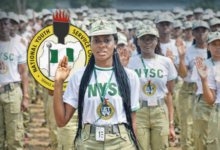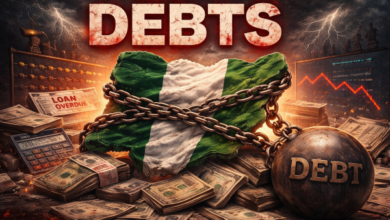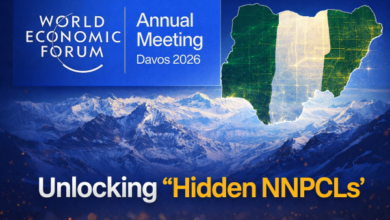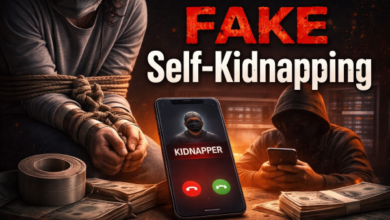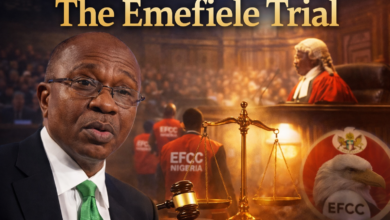RESTRUCTURING BRAND NIGERIA: IS IT TIME FOR MAKE OR BREAK?
 It is 2.00am on a chilly Wednesday night in June, 2017. Professor Yemi Osinbajo, Nigeria’s Vice-President, for the second time, serving as Acting President in the absence of President Muhammadu Buhari who is away on medical vacation, is deep in thought. After poring over security reports, he is wondering the best ways to settle the many security challenges that have been threatening the peace and indeed, unity of his motherland, Nigeria. What with Boko Haram, kidnapping, herdsmen terrorism, inter-communal clashes and other violent crimes to contend with.
It is 2.00am on a chilly Wednesday night in June, 2017. Professor Yemi Osinbajo, Nigeria’s Vice-President, for the second time, serving as Acting President in the absence of President Muhammadu Buhari who is away on medical vacation, is deep in thought. After poring over security reports, he is wondering the best ways to settle the many security challenges that have been threatening the peace and indeed, unity of his motherland, Nigeria. What with Boko Haram, kidnapping, herdsmen terrorism, inter-communal clashes and other violent crimes to contend with.
The security services have their hands full grappling with these challenges but the problem just moved up into a new vista with reports earlier in the day that a coalition of northern youth have issued an ultimatum that all Nigerians of Igbo descent must vacate the north otherwise they would face perilous consequences by the October 1, 2017. The group also asked their northern kin to return to the north before October 1, 2017. This is a new undesirable twist to Nigeria’s security problems. Memories of 1966-67 crises flood the Acting President’s mind: the needless pogrom, the pain, the suffering, the war, the death of millions of innocent lives.
After thinking through an outline of plans and strategy, to forestall any of these untoward possibilities, he takes a deep breath and gets into prayer. He is, after all, an ordained pastor…
After the third republic took off on May 29, 1999, several ethnic and geographical blocs within the Nigerian nation have lamented at various times about the marginalisation of their interests. Under President Obasanjo and Yar’ adua governments, the South-South zone comprising the six Niger-Delta states of Bayelsa, Rivers, Akwa Ibom, Cross River, Edo and Delta cried and are still crying till date about marginalisation even years after the Niger Delta Development Commission (NDDC) and the Ministry of Niger-Delta were created as panacea for the perceived injustice.
The South-West have always decried the perceived injustice in the sharing formula from the monthly federal allocations while elements in the South Eastern states have been lamenting the perceived total and long-standing federal neglect in the provision of critical infrastructure and lack of political inclusion in governance at the federal level in the aftermath of the civil war. In addition, numerous communities across the north have long alleged a perceived support for Fulani communities each time there is a crisis between the Fulanis and other tribes.
Enter the pro-Biafra group, the Independent People of Biafra (IPOB) whose mission includes excising all South-East states of Abia, Anambra, Ebonyi, Enugu and Imo states along with the South-South states and parts of Kogi and Benue to form a new country. Leader of the group Nnamdi Kanu became almost deified by his followers after he was released from prison custody on April 28, 2017 after 18 months in custody following terrorism charges. The fiery secessionist leader has been reported as calling Nigeria a ‘zoo’ which he wants to free his people from. Building on his increased popularity, he issued an ‘order’ that Igbos should observe a sit-at-home ‘protest’ on May 30, 2017 in honour of the ‘Biafrans’ killed during the 1967-70 civil war. Reports have it that his ‘order’ was largely complied with by the Igbos in the South Eastern states.
The perceived success of this exercise obviously did not go down well with some youth from the Northern part of Nigeria. Their reaction was as curious as it was explosive. Nigeria’s sectional schism took a new dimension when some youth groups in Northern Nigeria youth on Tuesday, June 6, 2017, in Kaduna issued what they termed a ‘Kaduna Declaration’ in which they declared that all Igbos residing in the north leave the area within three months. They ‘ordered’ northerners in the south-east to leave and return to their homelands, warning that as from October 1, which happens to be Nigeria’s National Day, they will commence the implementation of ‘visible actions’ to prove they are no longer part of a federal union that includes the Igbo.
The reason for their declaration was that the pro-Biafran activities of some Igbo, centred around the Indigenous People of Biafra (IPOB), including their latest action (of sit at home) and similar acts of confrontation to constituted authority “amount to a brutal encroachment on the rights of those termed as non-indigenous people residing and doing lawful businesses in those areas illegally demarcated and defined as Biafra by the Igbo.”
Their conclusion was that rather than certain a section holding the whole country to ransom at every turn, each should be allowed to go its own way. They warned the government that as from October 1, they will embark on what they called “peaceful and safe mop-up of all the remnants of the ‘stubborn Igbos’ that neglect to heed this quit notice,” towards “finally ejecting them from every part of the North.”
Before, the news could be properly digested among Nigerians, Prof. Ango Abdullahi, the Northern Elders Forum (NEF) spokesman threw his weight behind the call which many across the country considered obnoxious. Abdullahi told newsmen in Zaria days later that it was hypocritical for the Igbos to continue to live in other parts of the country while agitating for Nigeria’s break up. According to him, “Recently, people from the eastern part of this country, specifically the Igbos, were busy calling for the sovereign state of Biafra and from all indications, their leaders including governors are behind them. Whoever feels Nigeria “is not conducive for him” let him quit” he said.
He lambasted the Northern Governors’ Forum who had earlier condemned the call and wondered why they had not reacted to the persistent calls for the actualisation of Biafra and other agitations. He lamented that when Nnamdi Kanu was released on bail recently, over 100 vehicles escorted him to his residence including big personalities from the south-west and south-east. “This is somebody who has been agitating for the breakup of Nigeria but his people were behind him, therefore, I am behind the youths”.
Claiming that the northern youth have been pushed to the wall, Abdullahi said that the people from the south were always pretending that people from the north were cheating them. “These people always pretend that the North is cheating them, not minding the fact that Southern Nigeria was developed by resources from the North.
Not unexpectedly, these calls for expulsion of Igbos was also met with a torrent of condemnations from the federal government, the South East governors, as well as youth groups from the south-south, south west, south east as well as socio-political groups across the dived. Indeed by the next day, the Kaduna state governor, Mallam Nasir el Rufai issued an order that leaders of the groups that endorsed the quit notice should be promptly arrested by the security agencies. However, probably due to the sensitivity of the issue, that order was not carried out. Indeed, the same reason may be responsible for the non-revocation of Nnamdi Kanu’s bail that has flagrantly disobeyed his bail conditions part of which includes the not granting of press interviews and addressing public gatherings.
In reaction, the South East Governors’ Forum released a statement through its. Chairman, Mr. David Umahi saying: “The lives and property of law-abiding citizens of Igbo extraction are as precious as the lives and property of all Nigerians, irrespective of the region of their abode within this Republic. These must be guaranteed and defended against all forms of threat and aggression, both domestic and external, by the security forces/agencies of the Federal Republic of Nigeria… we have been collaborating with the security agencies to ensure that non-Igbo people living in the South-East, including Northerners, are adequately protected from harm’.
The governors implored well-meaning Nigerians, especially Northern religious leaders, leaders of socio-cultural groups in the North and the Nigerian Governors’ Forum to speak out against the incendiary utterances and conduct of Northern youths. They added that “The ugly lessons of history are too grim to be stoked with carelessness. As leaders, we must exert the full measure of our powers and influence to forestall a repetition”.
As the hours ticked on, the ethnic cleavages began to expand as counter quit notices were hurled at northerners by Ijaw youth, Yoruba youth, Edo youth and so on. The country became swamped in a canopy of hate speeches, invectives and diatribes. The country had not witnessed such wanton display of angst, bitterness and intolerance across the ethnic divide since the build-up to the civil war. Simply put, there is tension in the land.
Acting President Osinbajo was quick to condemn the quit notice and maintained that Nigeria’s unity was constitutionally guaranteed. He assured that the relevant security agencies were well equipped to protect life and property of all Nigerians irrespective of their ethnicity or state of origin. He then commenced a well-heeled strategy of stakeholder engagement with political and traditional leaders as well as leaders of thought from across the geo-political zones. He met with leaders from the South East and welcomed them with the following speech with captures in bold relief his summation of the problem and what needs to be done…
Let me first say how deeply grateful I am that you have responded so well and so quickly at very short notice to this invitation:
“Yesterday I kicked off a series of consultations and engagements with Leaders of Thought from the Northern States of Nigeria. It was a very useful meeting and today’s meeting is the second in the series with you, the Leaders of Thought from the Southeast.
After this, I will meet with Religious and Traditional Leaders again from the Southeast and on Monday I will be meeting with Religious Leaders also from the North. And then in the final consultations next week, I will be meeting both with state Governors and finally with all of the groups that I have met with from the North, the South and we’ll be joined I hope then, by the Governors also and we all hopefully be in the same room for further engagement and consultations.
I want to say again a very big thank you for your making the time to come to this particular meeting.
 These consultations are extremely necessary, and important, especially because of the recent events in our country and I am sure that most of us have followed this quite closely.
These consultations are extremely necessary, and important, especially because of the recent events in our country and I am sure that most of us have followed this quite closely.
You are all aware that there have been loud and sometimes hostile agitations by young people in the Southeast calling for secession from Nigeria. And then there was the recent ultimatum issued by a group of young people also from the North, asking all persons of Southeast origin living in the North to leave by October 1 this year.
Both of these expressions and agitations from both sides, have been attended with some controversial and very hateful approach including patently illegal and violence-inducing remarks.
I firmly believe that we ought to address these agitations and proclamations urgently and decisively. Burying our heads in the sand and expecting the storm to blow over of their own accord is not an option.
But equally not reasonable is falling for the temptation for any kind of tit-for-tat whether it is in the language used or it is in the kinds of gestures that have been expressed. This has never worked or moved anyone closer to a peaceful or sensible resolution.
And so it is in our bid, as government, to deal with these pressing issues and grievances, that we’ve convened these series of consultations, with various groups. It is the right and responsible thing I think for us as leaders not to shy away from the responsibility to ensure and uphold peace and security in our country.
And it is my view that the responsible role of those of us who are privileged to be leaders in our society is to chart progressive and lofty courses for our people, for the ordinary people. As leaders, we carry the burden to secure the peace, progress and prosperity of our people. And that is why our voices ought to be heard and heard loud and clear at moments like this in the defence and articulation of what is truly beneficial to the nation and the people, and what is right and patriotic.
Our dear nation has gone through very many difficult times. We have survived bloody coups, several rounds of ethno-religious violence. We have emerged even from a long and bloody Civil War. All of us here have seen close-up what violence can do to a country. I believe I speak for us all when I say that no one here is keen to see Nigeria embroiled in violence or bloodshed of any kind. Especially, not when we are only just emerging from a brutal insurgency that has consumed more than 20,000 of our brothers, sisters and children, as well as the better part of a decade in the Northeast of Nigeria.
One thing is clear – violence and war are not going to do anyone any good. They are terrible and they mean no good. They are easy to start but near impossible to end.
In fact, history has shown us especially contemporary history that wars today hardly ever end. They just simply go on. Indeed, you’re all aware of the Igbo proverb that says that “a man who rushes into battle does not realize that battle entails death.” We are witnesses to the unspeakable devastation that war continues to inflict across the world. No one who has seen the horrors of war – even merely on television – would wish it on their worst enemy.
It is also clear that wars sometimes start, not with bullets, but with words, hateful, incendiary speech, opening floodgates of blood. The tongue, like the pen, is often mightier than the sword – because it is what pushes the sword into action. When we throw words like stones in a marketplace we do not know who or what it will hit.
 Knowing this, under no conditions whatsoever should we tolerate or excuse or justify hate speech or hateful conduct of any kind, especially where such is illegal. Let me of course acknowledge that as part of living together in this space called Nigeria, misunderstandings and frustrations are inevitable. Because resources are limited there will always be a striving to get what is perceived as the best seat at the table.
Knowing this, under no conditions whatsoever should we tolerate or excuse or justify hate speech or hateful conduct of any kind, especially where such is illegal. Let me of course acknowledge that as part of living together in this space called Nigeria, misunderstandings and frustrations are inevitable. Because resources are limited there will always be a striving to get what is perceived as the best seat at the table.
All of that is normal and to be expected, especially in a democracy, like ours. A healthy democracy ought to be a theatre of energetic striving by all parties and stakeholders. But things should never descend to a level where mutual suspicions override the desire to live together in peace and harmony.
Yesterday I made it clear, very clear that hate or divisive speech, or divisive behaviour, where it is illegal, will be met with the full force of the law. And I want to say it again today that let there be no doubt whatsoever of the resolve of government to ensure that no one will be allowed to get away with making speeches that can cause division especially violence. We will take very seriously any attempts to cause violence or to disrupt the peace of Nigeria and it will certainly not be tolerated.
And the reason why it cannot be tolerated is that the very many innocent men, women, children and the vulnerable amongst us deserves safety and security and our own emotions must not be allowed to run wild in such a way as to endanger the lives of so many. And I believe that all are clear that we’re resolute in our determination as government to protect every Nigerian, everywhere in the country. Everywhere in this country, it is the primary duty of government to ensure the security of lives and property and we take that duty very seriously indeed.
We will do everything within our power to defend and uphold the terms of our constitution, which declares that we are one nation under God.
It also guarantees the free mobility of people, goods and services throughout the country, as well as full residence rights for every citizen in all and any parts of the land of their choice. It is also the aspiration of the Constitution to ensure a country in which, and I quote, “loyalty to the nation shall override sectional loyalties.”
And it is the responsibility of the Government to create the conditions for the attainment of these ideals. There is something that President Buhari is fond of saying, and he’s repeated it I am sure so many of us have heard it: that without peace and security there can be no development. That the first obligation that we owe if we want to develop, is to ensure peace and security. We cannot develop a country that is not in the first place safe and secure for all people. For this reason, we take extremely seriously our constitutional responsibilities as your government.
Those responsibilities also include listening to, consulting, and engaging with you; giving every citizen and every part of the Federation a sense of belonging and significance. And that is why we are here today.
I expect that our conversations here today will be frank and constructive, open and that all our deliberations will go towards ensuring that our country is a better place, a more peaceful place to live in. This is an important moment for all of us and for our country, and I hope that at the end of it we will all be satisfied that we have accomplished something significant not just for ourselves but for the future.
By the grace of God, we will leave to coming generations a peaceful, secure and prosperous nation; a nation in which all citizens, regardless of their ethnic, religious affiliations, or their ages or gender will feel deep and enduring pride.
Thank you very much again for making out time to come and I hope that our deliberations will be very fruitful and like I said, please let us be as frank as possible.
God bless you.”
Restructuring vs Seperation
There appears to be a general consensus that the country’s political structure needs to be restructured. Former Vice-President Atiku Abubakar has for long thrown his weight behind restructuring Nigeria. Former military President Ibrahim Babangida gave a surprise endorsement to the idea as indeed millions of Nigerians have been insisting on for years. However, hardliners like Nnamdi Kanu, Olisa Agbakoba who recently sued the federal government for unfairly neglecting the South East for decades and Annkio Briggs, a Niger-Delta rights activist believe that ‘everyone should go their own way’.
Interestingly, after initially scorning the idea, The All Progressives Congress, APC, recently constituted a nine-member committee headed by Governor Nasir el-Rufai of Kaduna State to address the increasing agitations for the restructuring of the country. Members of the committee include four other state governors – Rauf Aregbesola (Osun), Abdullahi Ganduje (Kano), Simon Lalong (Plateau) and Ibikunle Amosun (Ogun). Others are a former governor of Edo State, Oserheimen Osunbor; the National Organising Secretary of APC, Osita Izunaso; the party’s spokesperson, Bolaji Abdullahi; and Olubunmi Adetunmbi, a senator who will serve as secretary. According to Bolaji Abdullahi “The All Progressives Congress (APC) notes that with various agitations on restructuring, the concept has assumed several disparate meanings.
“In the light of this, at the fifth regular joint APC National Working Committee (NWC) /APC Governors meeting which held on Wednesday 19th July, 2017 a committee was set up to articulate the Party’s notion on restructuring.”
Restructuring however means different things to different people. It would be interesting to see what the ruling APC eventually comes up with as a solution to the agitations and restiveness on this issue.
Wild Goose Chase or the Real Deal?
This is not the first time in recent history that there has been a clamour and indeed an attempt at addressing the issues around the structure and operations of the Nigerian Brand. A major attempt by pro-democracy activists took place in Lagos in 2006 by the Pro-National Conference Organisation (PRONACO) led by the late Chief Anthony Enahoro when it held a ‘Conference of Ethnic Nationalities’. But the report was rejected by the then President Obasanjo’s Federal Government, which also organised another conference in Abuja thereafter. The report of the Abuja Conference by the Obasanjo government was allegedly sacrificed on the altar of the third term project of Obasanjo. The PRONACO members believed that, if its report of the Lagos Conference had been implemented, the country would have moved forward in its quest for peaceful co-existence, national unity and stability. President Goodluck Jonathan did his bit with his own National Conference in 2014 but the APC had always derided that attempt and vowed not to even consider its recommendations. Now that the clamour has refused to go away, the nation waits with bated breath on how the APC Federal government will sort out this nagging issue, the handling of which will either make Nigeria a better, stronger nation or finally break her.
Effect On The Economy And Nigerian Brands
The uncertainty that this unsavoury state of affairs has created is causing a lot of panic among business managers and owners. Despite the assurances of the Acting President, a lot of people are worried that the hate-mongering and threats are growing rather than abating. As it stands, no one knows for sure what will happen post-October 1, 2017 in the northern part of Nigeria without a clear- cut rapprochement being announced. This has serious implications for new investments in the northern part of Nigeria by existing and new business owners. While assurances of the political leaders are good and necessary, it is important to get the restive youth to publicly embrace and proclaim peace and withdraw and stop all violent threats because looking at the bile and sting of the words flying around, the war (of words) has started and, this is an investor’s nightmare. Those throwing such words must take them back in order to build trust and confidence across the length and breadth of Nigeria. We have an economy to rebuild and this state of affairs will only worsen it if we do not do the needful urgently.
Make Or Break?
Clearly, Nigeria is becoming dysfunctional under the current political structure. Thankfully, Acting President Osinbajo had earlier in the year exhorted Nigerians to work hard (and not depend on prayers alone) in order to achieve our goals. This problem will either make Nigeria stronger and better for everyone if properly handled or it would break her permanently. Whether the country will seize the moment and reinvent herself for rapid development or drift into a state of cataclysm depends on how the political elite play their cards…for better, or for worse?


